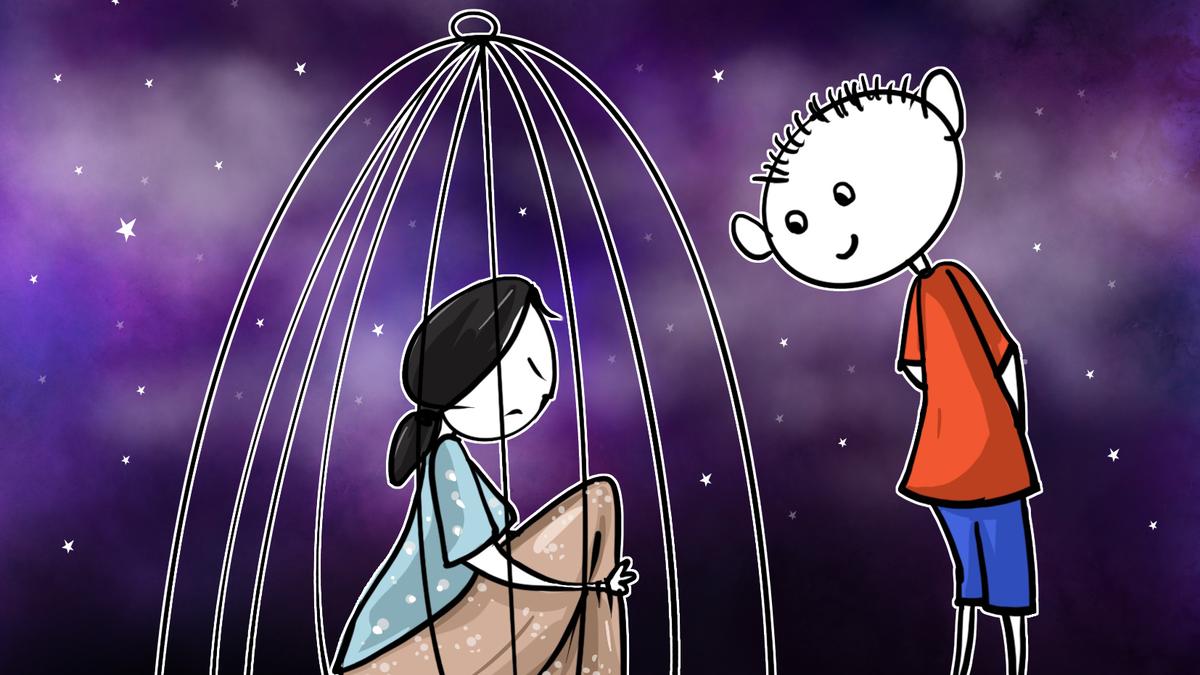
illustration for SM
| Photo Credit: Sreejith R. Kumar
I had a casual chat with my seven-year-old nephew that left me stunned. I asked about his sister’s presence, and he said that she had gone for tuitions. We continued the conversation about her studies. He said, “She gets second rank, but once she’s married, she will kiss her husband.” Before I could react, he added, “Yes, she will cook and clean the house.”
This reply left me even more stunned. I gently explained to him that women are not just homemakers, and gave the example of his mother, who works. But I am pretty sure by his reaction that he has not been convinced. This made me wonder how early these biases take root.
I believed that stereotypical notions about women’s “roles” had diminished over time. I thought we, as a society, had made progress. However, this brief interaction with my nephew, who lives in a semi-urban area, left me wondering about the situation in rural areas. Perhaps, for those of us living in cities, such outdated notions seem invisible, giving us a false sense of progress. But in villages, these stereotypes may still persist, quietly shaping young minds. Just because these biases are not always visible does not mean they have ceased to exist. Isn’t it?
As I reflected, my mind wandered to Periyar’s Why Were Women Enslaved? — a work written decades ago, yet painfully relevant today. Women work, earn, and excel, but do they truly own their lives? Take contraception, for instance. Why is it almost always a woman’s responsibility? Birth control pills, intrauterine devices, sterilisation — women bear the risks and side effects. Meanwhile, vasectomy, a far simpler and safer procedure, is rarely encouraged for men on the pretext that it diminishes masculinity.
Another burden forced on women, another freedom denied. And what of chastity? A woman’s worth is still shackled to her “purity”. Virginity is sacred. Male promiscuity? Just boys being boys. In marriage, his infidelity is excused, while hers becomes a scandal. Chastity is not a virtue — it’s a weapon of control. If it’s so noble, why aren’t men held to the same standard?
A divorced woman is a “failure”. A widow is “inauspicious”. A childless woman is “selfish”. A working mother is “neglectful”. When does a woman ever get to just be? From marriage to motherhood, from career choices to ageing, society weighs women down with impossible standards while men walk free. A divorced man remarries without judgment; a divorced woman is pitied or shamed. A widower moves on; a widow is expected to disappear into mourning. A child-free man is making a “personal choice”; a child-free woman is “unnatural”.
Even in grief, inequality thrives. Women are barred from performing last rites — because tradition decrees that only sons can carry a legacy. Daughters who dare to claim this right face outrage, as if love has a gender. Dowry may be illegal, but its shadow lingers. A woman’s marriage still comes with a price tag — sometimes literal, always societal. A man who “accepts” her without dowry is hailed as noble. The woman? She is just fulfilling her duty.
Deeply ingrained
We pretend we have progressed, but the truth is in the whispers. This conversation with my young nephew may have seemed small, but it was a glimpse into how deeply ingrained these beliefs still are. Progress is not about a few success stories. This is not progress — it’s oppression in polite disguise. We are told we are equal, right after being reminded of our place. We are encouraged to dream big, as long as we know our limits. They celebrate our strength, yet expect us to suffer in silence. We are free to choose — only from the options given to us. Our success is praised, but only if it does not overshadow theirs.
We are taught to be independent, yet expected to depend on others. They call it duty, we call it control. For too long, women have been told where to stand, how to speak, and what to endure. But enough. We are not vessels of sacrifice or symbols of purity or equal to God — we are just humans and obliged to be the force of change often. No more waiting, no more whispering. The world will shift, not when it allows us space, but when we take it without asking.
Published – July 06, 2025 04:12 am IST
